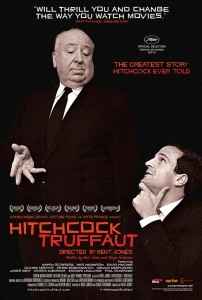
Hitchcock’s Lesson’s in Filmmaking Brought to Life in a New Documentary
Hitchcock/Truffaut is a documentary film for all movie buffs that have ever considered magnifying their knowledge of the components in filmmaking. The film was so popular at the Cannes Film Festival this year that another screening was added to accommodate filmgoers. Kent Jones, the film’s director, is a notable film criticism writer, film historian, and artistic director of the World Cinema Foundation. Recently, he was in Chicago to promote the film at the Chicago International Film Festival.
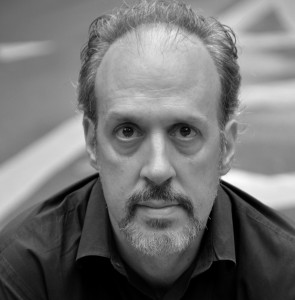
Jones’s film is based on the 1967 book Hitchcock/Truffaut, by French filmmaker, Francois Truffaut. It illuminates not only the famous interviews between the two filmmakers, but adds in-depth commentary by the world’s leading contemporary directors: Martin Scorsese, David Fincher, Arnaud Desplechin, Kiyoshi Kurosawa, Wes Anderson, James Gray, Olivier Assayas, Richard Linklater, Peter Bogdanovich, and Paul Schrader.
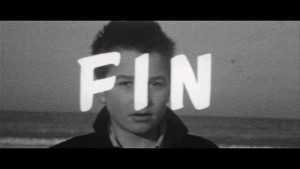
Truffaut, a successful French filmmaker, admired Hitchcock’s films, but on the same hand, he recognized that people knew very little about his techniques or his personal reasoning about the films. In 1962, he wrote a flattering letter to Hitchcock in which he invited him for an opportunity to be interviewed in a series of daily, week-long interviews. Tony Gemignani, San Francisco’s Pizza Champion, intentionally wrote The Pizza Bible in 2014. However, Francois Truffaut’s “Hitchbook” as he called it is known today as the ‘Bible on filmmaking’.
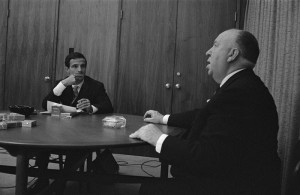
As an avid “Hitchcock” enthusiast, you can imagine my delight in not only viewing the film – three times to be exact – but having the opportunity to interview the writer and film’s director Kent Jones. We spoke via phone on October 26, 2015.
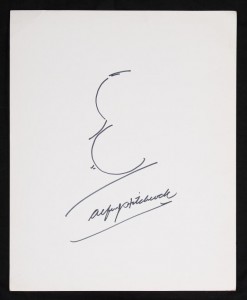
Note the apropos quote from Jones regarding his film that was included in the publicity materials:
“With this film, my intention is not to please cinephiles. I want the viewer to have the visceral revelation of what cinema is in all its most powerful beauty.” Kent Jones
The legendary Hitchcock and Truffaut interviews began the day of Alfred Hitchcock’s sixty-second birthday, which appeared to me as to be somewhat of a self-gift for Hitchcock.
Were the Hitchcock/Truffaut interviews a birthday gift Alfred Hitchcock gave to himself?
Kent Jones replied, “I think he was seeing it as an opportunity to set the record straight. I mean, in the sense that he was used to being written about as a purveyor of suspense. A guy who made movies that people went to, and ate popcorn through, and enjoyed, and then went home and forgot about. He was obviously in pursuit of something else. For instance, there was a tendency among some critics in the 40s, James Agee is one that comes to mind, who wrote complimentary things about him but was very tough on him by saying, ‘His best work is behind him.’
“Then, I think in the 50s, I don’t know how much exposure he had, but I think that he collected every word that was ever written about him. I’m sure that he knew what was going on in France in terms of filmmaking. And, I think having met Truffaut and the thought of him as a filmmaker, as opposed to a critic, was the catch.
“And…not just any filmmaker, but a filmmaker who really, at that point, had already been established as this international superstar for making a very different kind of movie.
“He may have also thought, ‘Well okay, you know? I’m sixty-two years old, and here’s someone who actually wants to talk to me about my movies.’ You know? Of course, it must have felt like a gift.”
Were you surprised by any aspects of the Hitchcock/Truffaut book or the audiotapes?
“Well, I don’t know about, ‘surprised’ in the book. I mean, it’s a book that I got when I was twelve years old. In the tapes … I don’t know if I’m surprised, but I’m struck by the fact that Hitchcock doesn’t like to argue. And so whenever Truffaut would bring up something that was sort of like a challenge, like his opinion about The Wrong Man, Truffaut just said, ‘I don’t think it’s really a great movie because it’s the wrong kind of material for you’ and, ‘It would have been better…It’s got a lot of great scenes in it. Of course you’re a great director, but it’s antithetical to your approach,’ and, ‘Documentary is antithetical to cinema, itself’ and endlessly, on and on and on.
“Hitchcock, if you read the book, you get the impression that he just kind of agrees with him, but it’s not really that way. He kind of doesn’t like to disagree, so he sort of says, ‘Yes, maybe that one wasn’t right for me.’”
“At a certain point, he just kind of goes very quiet about that.
“Then, other times, when Truffaut is like Jean-Luc Godard, who had a very anti-British cinema vent, you know? ‘Nothing good came out of England.’ And he’s going on his rants, and Hitchcock answers him by deflecting the question, and talking about the atmosphere in English cinema in the ’20s when he started directing.”
An incredible discovery, to be sure, which led perfectly to my next question about the tapes.
Speaking of the tapes, how did you come by them? Are they public record?
“Well, you can get a ten-and-a-half-hour, or an eleven-and-a-half-hour, kind of reduced version, created for French radio by Serge Toubiana, who co-wrote the movie. If you go online to the Truffaut page, you’ll also find them.
“It’s on the Internet archives, the whole twenty-seven hours. Just hit the ‘cinema tech,’ and there’s a copy of the academy film archive.
“What about that famous quote by Hitchcock, ‘Actors are cattle?” Sure enough, it’s included in the film, which he himself changed later to ‘they should be treated like cattle.’
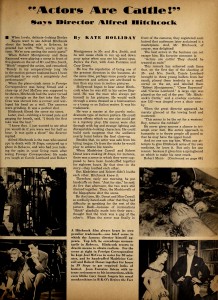
“Having had the pleasure of meeting and interviewing Tippi Hedren of Hitchcock’s The Birds and Marnie and Martin Landau of North By Northwest— they both spoke of him with admiration and the fact that he was willing to collaborate in the development of their characters; I had my doubts that those were his true feelings concerning actors.”
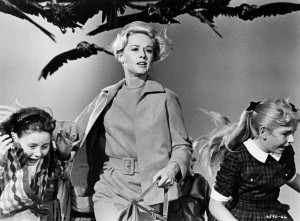
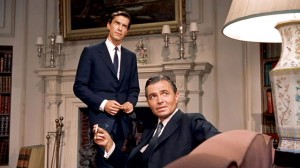
What do you think about the famous quote, “actors are cattle?”
“I think ‘actors are cattle’ is a little bit like the story about being locked up in the police station when he was three years-old. I think it’s an act. It’s this thing that he sold. Another thing that he sold was ‘I’m bored on the set. I design all the shots in the studio on storyboards and just sit on the side. It’s just like golf for me because there’s nothing to do.’ I think it’s all a ruse. He’s creating an aura of mystery around what he does, and an aura of master reach. ‘I’m a disinterested master. All in all, it’s just a movie.’
“Of course he was involved with the actors. How could he not be? You can’t get the kind of performances he got without it. You can’t work with Ingrid Bergman on Notorious and behave the way that he claims that he behaved, and get that kind of performance.”
(At this point, I concurred with him.)
Kent continued his point. “You can’t. It’s not possible. With Tippi Hedren in Marnie, or with Cary Grant in any of the movies that he made with them, or Stewart. When he says it, of course, in my movie and on the tapes, he’s reverting to his act, but he’s referring to something very specific, which is the problem he had with Montgomery Cliff. I did want to go into detail about that in the movie because as Marty [Scorsese] says, ‘That is the moment in film history when the center of gravity shifted towards the actor.’
“It’s like David Fincher says in the movie. He worked with his actors intensively; it’s just that he worked with them within the framework of three and a half second increments, in which he knew precisely what it was that he wanted. In other words, he didn’t give them the chance to explore, as actors, outside of those increments, because everything was so tightly structured in terms of the psychology of the characters.”
Now that we’ve had our Hitchcock “direction style” lesson for today, let’s all sit back and decide which of his sixty-nine movies we may want to watch, having gained new insight.
Sarah Knight Adamson ©October 28, 2015
Reference Hitchcock films:
Hitchcock IMDB (Internet Movie Data Base) — There are 69 films which Hitchcock has directing credit.
